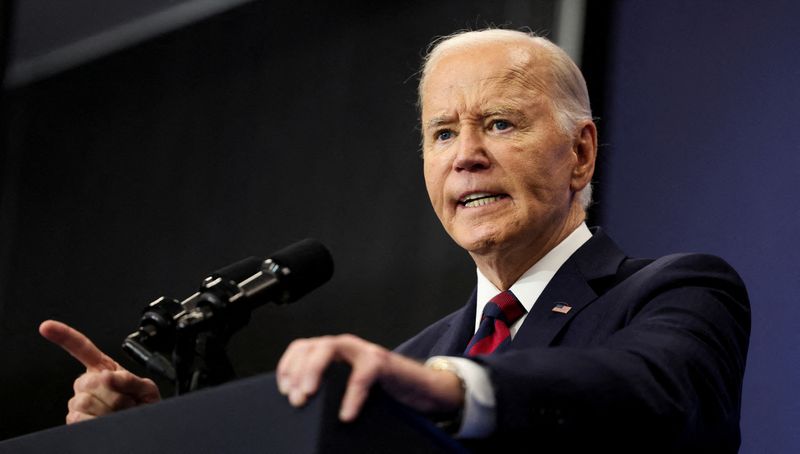Biden commutes sentences of 37 of 40 inmates on federal death row

By Nandita Bose
WASHINGTON (Reuters) – U.S. President Joe Biden on Monday commuted the sentences for 37 out of 40 federal inmates on death row, converting them to life in prison without parole before he hands over power to President-elect Donald Trump on Jan. 20.
Biden’s move will frustrate Trump’s plan to resume a rapid pace of executions. Unlike executive orders, clemency decisions cannot be reversed by a president’s successor, although the death penalty can be sought more aggressively in future cases.
Trump restarted federal executions after a nearly 20-year pause during his first term in office from 2017 to 2021.
Biden, who ran for president opposing the death penalty, put federal executions on hold when he took office in January 2021.
In recent weeks, he has faced pressure from congressional Democrats, opponents of capital punishment and religious leaders such as Pope Francis to commute federal death sentences before he leaves.
“Make no mistake: I condemn these murderers, grieve for the victims of their despicable acts, and ache for all the families who have suffered unimaginable and irreparable loss,” Biden said in a statement.
“But guided by my conscience and my experience … I am more convinced than ever that we must stop the use of the death penalty at the federal level,” he said. “In good conscience, I cannot stand back and let a new administration resume executions that I halted.”
Earlier this month, Biden commuted the sentences of nearly 1,500 people and pardoned 39 more convicted of nonviolent crimes.
He also issued a full and unconditional pardon of his son Hunter, after repeatedly insisting he would not do so. Hunter Biden had pleaded guilty to tax violations and was convicted on firearms-related charges.
The decision issued on Monday does not apply to cases of terrorism or hate-motivated mass murder.
It leaves out three of the most well-known men on federal death row: Dzhokhar Tsarnaev, convicted for his involvement in the bombing at the Boston Marathon finish line in 2013; Dylann Roof, convicted for the shooting spree at the Emanuel African Methodist Episcopal Church in Charleston, South Carolina in 2015; and, Robert Bowers, who was convicted for the mass shooting at the Tree of Life synagogue in Pittsburgh in 2018.
All three men have filed appeals and legal challenges to their sentences which must be resolved before an execution date can be set, a process that can take years.
Biden’s decision also does not affect the nearly 2,200 death row prisoners convicted in state courts, as he holds no authority over such executions.
Presidents typically order a round of pardons toward the end of their time in office.
The Office of the Pardon Attorney, part of the Justice Department, has received nearly 12,000 requests for clemency during Biden’s term, according to a tally kept by the pardon attorney. As of Dec. 9, the president had issued 161 clemency grants — 26 pardons and 135 commutations.
(Reporting by Nandita Bose in Washington; Additional reporting by Jonathan Allen in New York; Editing by Kieran Murray and Nicholas Yong)